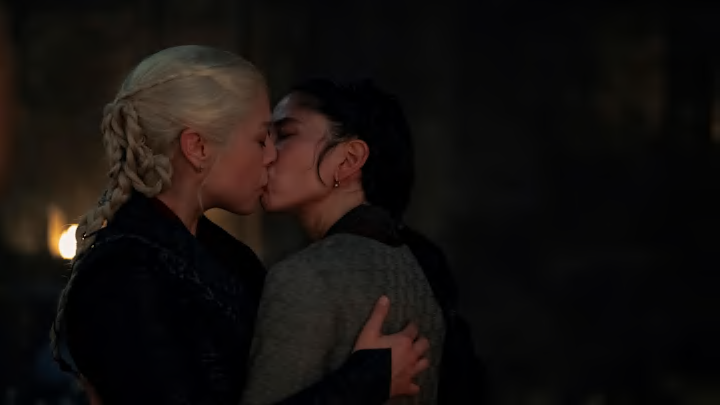"Toxic fandom" has become a buzzword in the past couple decades, particularly as more and more people go online to express opinions about their favorite shows, movies and games. There's nothing wrong with chatting about art, obviously, but the toxicity comes in when fans are unfailingly, gleefully negative about this or that franchise, often for pernicious reasons that spill into ugly real-world conflicts.
A lot of the worst examples are based in bigotry. Look at The Acolyte star Amandla Stenberg, who is Black, who described a "rampage of...hyper-conservative bigotry and vitriol, prejudice, hatred and hateful language towards us" after her Star Wars show started to air. Or look at the way fans review bomb certain episodes of TV. It's no coincidence that the two lowest rated episodes of HBO's zombie apocalypse show The Last of Us are "Long, Long Time" (which is one of the best episodes of TV produced so far this decade) and "Left Behind," both episodes that revolve around same-sex relationships. Or observe how the lowest-rated episode of House of the Dragon is "Smallfolk." "Smallfolk" is one of the better outings from the show's second season, but it features a kiss between two female characters. You don't need to be a genius to see the pattern.
“It comes with the territory, but it’s gotten incredibly loud in the last couple years,” a veteran marketing executive told Variety about the toxic fandom phenomenon. “People are just out for blood, regardless. They think the purity of the first version will never be replaced, or you’ve done something to upset the canon of a beloved franchise, and they’re going to take you down for doing so.”
Not many people were willing to use their names when talking with Variety for their article for fear of causing another backlash, if they were willing to speak on the subject at all. One of the few who did was John Van Citters, who's worked in brand development for the Star Trek franchise since the 1990s. "The vast majority of any fandom are casual fans,” he reminded the outlet. “The number of people who live and die on their franchises are very, very few, and then those who come after things that they espouse to love with venom are a really, really tiny subset of that already smaller subset of fandom. It’s just much easier to see it now. I don’t know that it’s really that much broader than where things were in 1995 — it’s just that the bullhorn wasn’t there.”
Whatever their numbers, toxic fans are loud enough to be influential, and studios have different methods of dealing with them. “Particularly when it’s a negative, toxic conversation, we don’t even engage,” says a TV marketing executive. “Like with toxic people, you try to not give it too much oxygen.” Instead, studios amplify more positive voices. “We’ll reply to comments that are positive and elevate those things."
I can see that leading to another problem: studios being rightfully afraid of engaging with bad faith, toxic criticism to the point where they ignore good faith critiques that could help the underlying shows or movies improve. Like, I had a good number of criticisms of House of the Dragon season 2, but none of them had anything to do with Black dragon-riders or a same-sex kiss. At the same time, I get why studios might only choose to engage with compliments: it can be difficult to pick out the good faith critiques from the bad faith ones, especially when there's a cottage industry on YouTube and elsewhere of creators rage-baiting their viewers or decrying this or that franchise for "embracing wokeness."
But some studios are still trying to find a way through. Behind the scenes, some put their actors through social media training, and may scrub their info from the internet to prevent doxxing if the actor is receiving threats of violence. Ideally, studios want to avoid any kind of backlash in the first place. To that end, in addition to normal test screeners, some studios assemble a panel of superfans to weigh in on new projects. “They’re very vocal,” said a studio executive. “They will just tell us, ‘If you do that, fans are going to retaliate.’” In some cases, this may lead to alterations. “If it’s early enough and the movie isn’t finished yet, we can make those kinds of changes.”
Generally, studios want to rock the boat as little as possible, so if they do make a direct statement, you know the toxicity has gotten very serious. That kind of thing happened during the first season of The Lord of the Rings: The Rings of Power, where several cast members of color received vicious backlash. In that case, Amazon made a statement of solidarity with the actors. And according to Amazon executive Vernon Sanders, that may have helped keep a lid on things for the show's recently completed second season. “People have had a chance to actually engage with the show,” he said. “Overwhelmingly, what we’ve seen is that folks who came with an open mind can discuss and debate their favorite things — which takes you out of the place of that ugly conversation that happened with some folks who may have been infused with an agenda that’s separate from the show itself.”
With so many of these backlashes being powered by bigotry, I'm not surprised that some of them burn themselves out; being a bigot is exhausting, and there's always a new flashpoint to get up in arms about. As a closer, I'll reiterate that I hope studios can find a way to separate the good faith criticism that could be useful from the toxic noise that isn't. The problem persists, so they'll probably have lots more opportunities to try.
To stay up to date on everything fantasy, science fiction, and WiC, follow our all-encompassing Facebook page and Twitter account, sign up for our exclusive newsletter and check out our YouTube channel.
